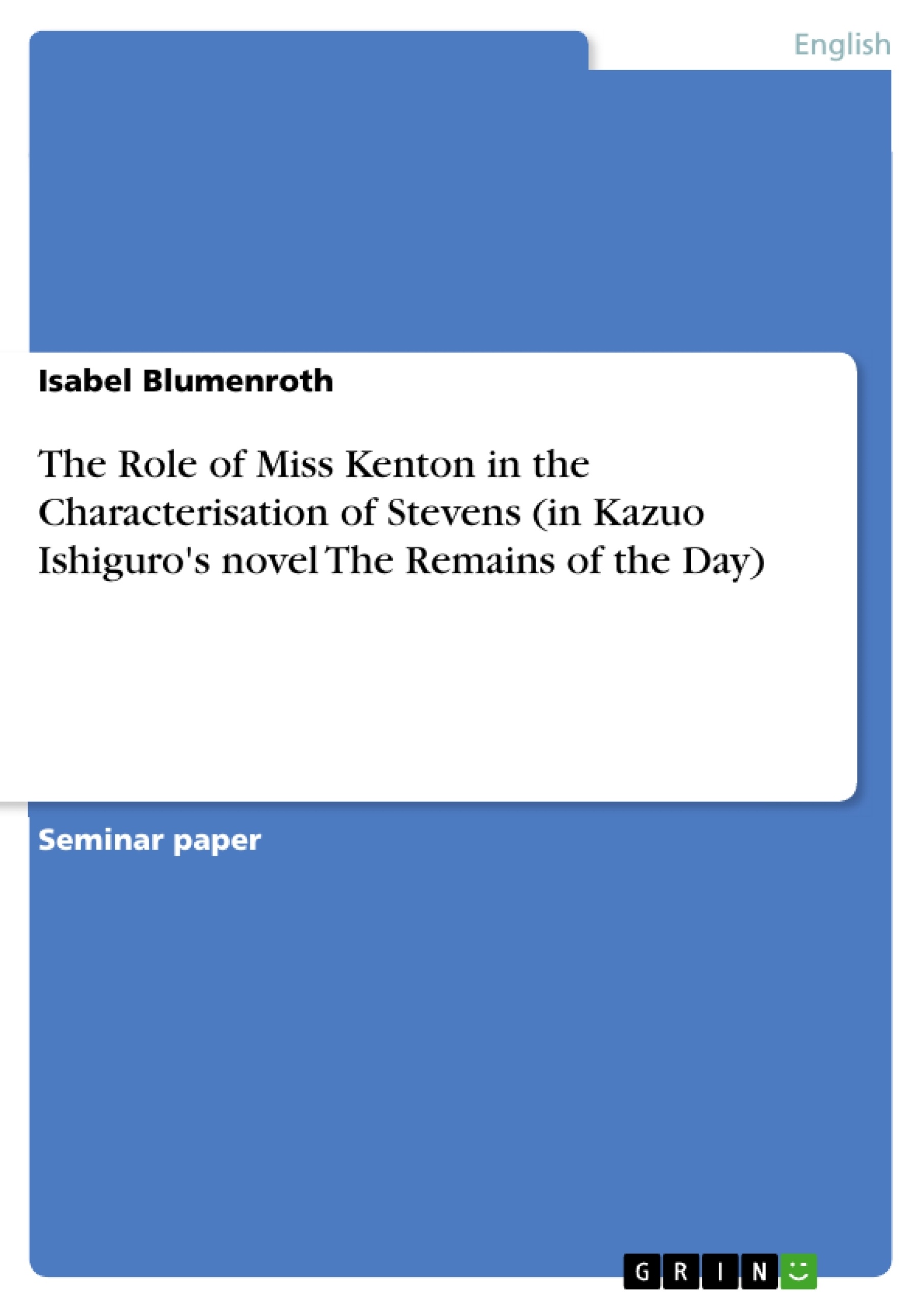This retrospection gradually reveals Stevens' peculiar character. Accordingly,The Remains of the Dayis a novel about the central figure's character and the change it undergoes in the course of the years. Characterisation plays a very important role in it. The use of diary-like entries for certain stops on Stevens' journey suggest the explicit characterisation of the figure through the first-person narrator. However, the reader is confronted with an unreliable narration that combines homodiegetic and extradiegetic features in regular intervals. Thus the reader cannot fully rely on the statements of the narrator in order to get a picture of his character. What is much more telling is the butler's way of hiding and overlooking things, his not-telling, which characterises him far better and more objectively than his own notion of himself does. Due to the narrative perspective and Stevens' few relations in life4there are not many subsidiary figures who can serve as an additional source describing the butler's traits of character. Nevertheless, there is one figure in the novel which can give information about the former stateandchange of Stevens' character. This figure is Miss Kenton, who has been the housekeeper at Darlington Hall for many years and who developed a relationship to Stevens that can be called the most emotional he had ever had. It is the purpose of this paper to analyse her role in the characterisation of Stevens. However, I want to stress that this paper is not supposed to be a full and exhausting characterisation of the figure of the butler. It is rather intended to deal with the different aspects the figure of Miss Kenton contributes to the characterisation and change of character Stevens undergoes in the course of the novel. This will be done by focussing the following aspects: 1. Miss Kenton's direct statements about Stevens. 2. The relationship between Stevens and the housekeeper and what it tells about Stevens' emotional life. 3. The interaction between the two figures. This aspect will briefly deal with their dialogues and will be combined with the comparison of Stevens' and Miss Kenton's highly contrary natures and what they mean with regard to the revelation of Stevens' character traits. According to these aspects, my analysis will mostly remain on the story-level only. The discourse level might be touched as far as the narrative situation is concerned, since most of the information about Stevens is conveyed through his own narration.
Inhaltsverzeichnis (Table of Contents)
- Introduction
- The explicit characterisation of Stevens through direct statements made by Miss Kenton
- The relationship between Stevens and Miss Kenton and what it reveals regarding the butler's character and emotional life
- The relationship of Stevens and Miss Kenton during their working together at Darlington Hall
- Their relation after Miss Kenton's departure from Darlington Hall
- The comparison of the contrary natures of Stevens and Miss Kenton and their function in the characterisation of the butler
- Conclusion
Zielsetzung und Themenschwerpunkte (Objectives and Key Themes)
This paper aims to analyze the role of Miss Kenton in the characterization of Stevens, the central figure in Kazuo Ishiguro's novel The Remains of the Day. The focus is on the different aspects Miss Kenton contributes to the characterization and change of character Stevens undergoes throughout the novel, without aiming to provide a complete and exhaustive characterization of the butler.
- Miss Kenton's direct statements about Stevens
- The relationship between Stevens and Miss Kenton and what it reveals about Stevens' emotional life
- The interaction between the two figures, including their dialogues and the comparison of their contrary natures
Zusammenfassung der Kapitel (Chapter Summaries)
The first chapter introduces the reader to Stevens' life as a butler at Darlington Hall, focusing on his unwavering dedication to his profession and his employer, Lord Darlington. The second chapter delves into the relationship between Stevens and Miss Kenton, exploring their shared history and the impact of their contrasting personalities on each other. It also examines how their relationship reveals Stevens' hidden emotions and his struggles with self-awareness.
The third chapter analyzes the consequences of their contrasting natures, highlighting how Miss Kenton's open-mindedness and emotional intelligence challenge Stevens' rigid adherence to tradition and his suppression of his own feelings. Through their interactions, the chapter explores the complexities of their relationship and the impact it has on Stevens' personal growth.
Schlüsselwörter (Keywords)
This paper explores key themes and concepts related to characterization, interpersonal relationships, and the complexities of emotional restraint in the context of a fictional narrative. It focuses on the analysis of a specific character (Stevens) and his relationship with another character (Miss Kenton), exploring the interplay between their contrasting personalities, their impact on each other's character development, and the role of their relationship in unveiling the protagonist's hidden emotions.
- Quote paper
- M.A. Isabel Blumenroth (Author), 2002, The Role of Miss Kenton in the Characterisation of Stevens (in Kazuo Ishiguro's novel The Remains of the Day), Munich, GRIN Verlag, https://www.grin.com/document/60193



